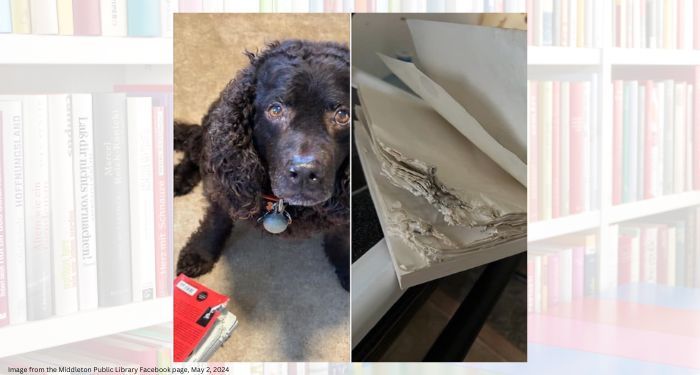Earlier this year, Worcester Public Library in Massachusetts introduced March Meowness to help cardholders who may have fines on their accounts due to damaged or lost items. The library, already fine free for overdue materials, offered to waive fees for damaged or missing items if patrons showed them a photo or drawing of a cat. It was an exceptionally popular program, and now, more libraries are using their innovative idea as a template to help their own patrons get rid of fines related to material damage.
Middleton Public Library outside of Madison, Wisconsin, introduced a new policy that allows patrons who have damaged materials to have the fines waived if they share a photo of the culprit behind the damage. The library, does not charge fines for overdue materials, shares photos with permission on their social media.
“The reaction has been wild,” said Rebecca Light, support services librarian at the Middleton Public Library, to The Dodo. “The second post featuring the dog Quik really took off.”
This program, aimed to help reduce the costs of replacing damaged materials for patrons, has the added benefit of normalizing material damages. While no library would want to promote the fact books and other items get damaged and that it’s okay to cause damage purposefully, showcasing these stories helps reduce anxiety and worries around damages not necessarily caused by the person who borrowed items (as someone who has had to explain more than once that yes, my rabbit ate the pages of the book, this normalization has power!).
The library staff came up with it after being inspired by Worchester’s cat program and knowing how common it is for pets to be the reason why a book might be missing some pages or the cover took on a new shape.
In an interview with Fox News Digital, Deputy Library Director Katharine Clark said that so far, four patrons have taken advantage of the program–two since Quik’s appearance on May 2. Clark believes the program helps alleviate the worries some still have that damaged materials means that a patron will lose their ability to use the library. But that’s not true.
“[W]e are all human and understand that accidents happen,” she said in the interview. “We would never want one damaged item to destroy someone’s relationship with the library.”
It’s a modern and clever iteration of the pet shaming meme popular in the mid-2010s.
The program isn’t limited to dogs, though so far, those have been the only damage culprits. Given the social media response from the first four offenders, it is likely the library will see a variety of pets behind material damages soon.
Given the movement to rid libraries of overdue fines, it isn’t out of the question that more public libraries will continue to develop and promote creative programs like this to help reduce to burden of damaged items fines. Libraries adapt and programs like this counter some of the still-prevailing narratives and perspectives of libraries being stuffy, strict institutions.

